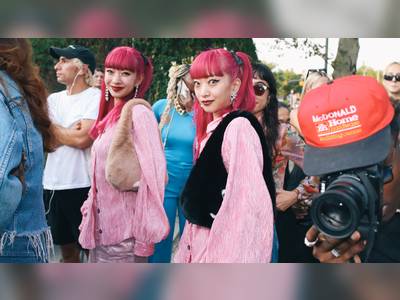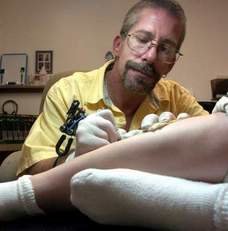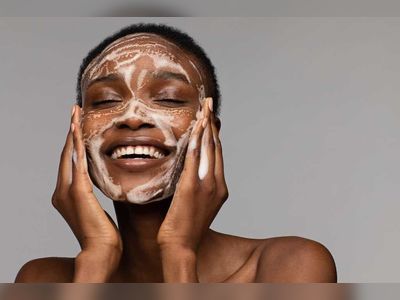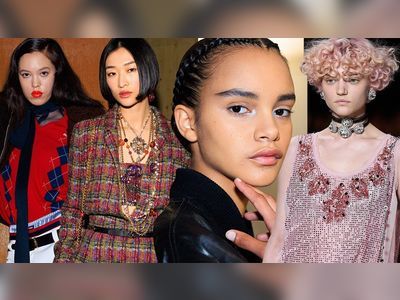Aside from the cluster of knives surrounding a sign that jokingly
reads, "Free In House Tattoo Removal," the private room looks more like
a physician's office than a tattoo parlor.
And if Ellingwood,
who flinches at putting in eyedrops, were not afraid to feel the needle
near her eyes, she would not hesitate to get eyeliner tattooed on in
the adjacent room, she said.
"We're trying to break away from
the traditional tattoo studio, where you walk in and see skulls and
crossbones on the walls," said Gale Hartvigsen, owner of the shop,
Artistry Concepts Permanent Cosmetics and Body Art.
The shop's
tattoo artist, Mark Weston, specializes in permanent makeup as well as
custom tattooing. So, Hartvigsen wanted it to appeal to a broad
clientele.
Since the studio opened in December, Weston has
performed about 100 jobs. Demand for tattoos and permanent cosmetics
has been about even, Hartvigsen said.
Hartvigsen's shop is
unique in the region, but according to experts in the field, the merger
of permanent cosmetics and tattooing in a neutral setting is slowly
increasing.
When visitors walk through the front door, the first
thing they see is a bright tropical mural and a waiting room with a
television and overstuffed leather couches.
There are no trinkets for sale, no jewelry on display and no books full of flash -- the tattoo trade's equivalent of clip-art.
Nationwide,
more traditional tattoo artists are practicing in bright, medical-like
studios because they want clients to feel safe. Permanent-cosmetics
artists, meanwhile, are trying to get out of the salon environment, to
avoid nuisances such as nail dust from manicures.
"It's a
growing trend from both aspects," said Kate Ciampi, executive director
of the Society of Permanent Cosmetic Professionals.
She said the
merger works because permanent cosmetics, such as eyeliner and
lipstick, are technically tattoos, and the general public has come to
accept tattooing.
But there are still few places that go out of
their way to offer permanent cosmetics and tattooing the way Artistry
Concepts does, said Sailor Bill Johnson, executive office director for
the Alliance of Professional Tattooists board.
"Usually it's
more hassle than it's worth to deal with permanent cosmetics," Johnson
said. He said most tattoo artists would rather focus on their art.
If they offer cosmetics, it is often done only on request and not advertised, he added.
That
is how Deborah Surace operated Cookies Tat Shack, until she began
receiving a lot of requests for permanent lipstick, eyebrows and
eyeliner.
She made permanent cosmetics a part of her Bradenton
shop last year by contracting with Peggy Marelli, who is trained
specifically in permanent makeup.
"The tattoo artists do just as good a job as her. We just wanted an esthetician to be more professional," Surace said.
The cosmetic room is private and spa-like, with a comfortable table, soothing music and candles.
Although Surace considers it a good addition, permanent makeup represents only 10 percent to 20 percent of her business.
Pretty
red couches and tidy decor give her shop a high-end atmosphere, but it
is primarily a tattoo shop and there is a stigma tied to that, Surace
said.
"Women who are looking for permanent makeup are scared to
go into a tattoo shop, whereas if they looked at our tattoo studio,
they would be so impressed," Surace said.
When planning the
business model for Artistry Concepts, Hartvigsen, who has no tattoos
and refers to most tattoo parlors as scary, was particularly sensitive
to that stigma.
The front lobby walls of her establishment have
no wizards slaying fire-breathing dragons and no topless divas in
distress. Instead, there are photos of Weston's tattoos and before and
after shots of his permanent cosmetic work.
Ellingwood, who has experienced the traditional parlor, said the atmosphere at Artistry Concepts works for her.
"It's very sterile," she said. "It just makes you feel comfortable."

Phil Oh’s Best Street Style Photos From the New York Fashion Week Spring 2023 Shows
This season New York Fashion Week has brought in a worldwide crowd of stars thanks to a packed season that even includes shows...










